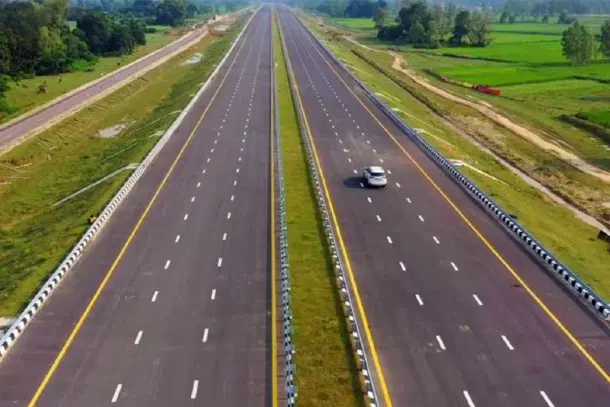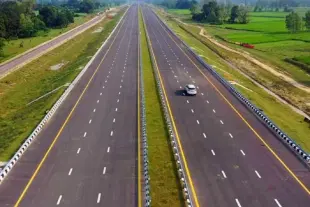Infrastructure
Building Roads Of Tomorrow: NHAI To Build Self-Repairing Highways To Combat Potholes
V Bhagya Subhashini
May 01, 2024, 01:56 PM | Updated 01:56 PM IST
Save & read from anywhere!
Bookmark stories for easy access on any device or the Swarajya app.


The National Highways Authority of India (NHAI) is spearheading efforts to introduce roads that possess the remarkable ability to repair themselves.
NHAI has initiated work on embracing a cutting-edge technology designed to revolutionise road construction across the country.
This innovative technology involves the use of self-healing asphalt, which promises to tackle the persistent issue of potholes, a major contributor to road accidents and fatalities in India.
A senior government official revealed, "We are exploring ingenious and unconventional methods to enhance durability and address the pothole problem."
According to the official, self-healing asphalt, with its intrinsic capacity to mend damage autonomously, holds immense promise in mitigating the pothole menace. However, the government intends to conduct a comprehensive cost-benefit analysis before fully embracing the technology.
"This has the potential to significantly extend the lifespan of roads and virtually eliminate the need for frequent maintenance, thereby reducing traffic disruptions," the official added.
The urgency of implementing such transformative measures is underscored by the alarming statistics. In 2022, India witnessed a staggering 22.6 per cent surge in road accidents attributed to potholes on national highways, reaching a grim tally of 4,446 incidents, compared to 3,625 in the previous year. Tragically, these accidents claimed the lives of 1,856 individuals, marking a distressing 25.3 per cent year-on-year escalation.
Innovative technology
Asphalt, a composite of gravel and sand bound together by bitumen, forms the backbone of road construction. Over time, the bitumen deteriorates, leading to erosion of the asphalt and the formation of cracks, which eventually evolve into hazardous potholes. The innovative self-healing technology tackles this degradation by empowering asphalt to repair itself.
Key to this process is the incorporation of small pieces of steel wool into the bitumen, rendering it conductive. Once the asphalt is laid and solidified, induction heating can be applied to activate the bitumen, enabling it to seamlessly rebind with the aggregate materials in the asphalt mixture, as per an Economic Times report.
In light of these advancements, the Ministry of Road Transport and Highways has allocated Rs 2,600 crore for road maintenance in the fiscal year 2024-25. While this mirrors the budgetary and revised estimates for the preceding year, it represents a marginal increase from the Rs 2,573.66 crore expended in 2022-23.
The allocation reflects the government's commitment to embracing innovative solutions aimed at enhancing road infrastructure and ensuring safer travel experiences for all.
V Bhagya Subhashini is a staff writer at Swarajya. She tracks infrastructure developments.





